Caryn
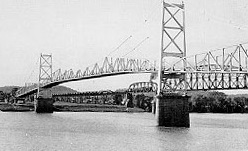
 Over time, architecture has taken many turns. Some buildings last for thousands of years, and others struggle to last a hundred years. Also, some structures go through more things that can degrade them, such as the elements and usage. Such as the case with the Silver Bridge. The Silver Bridge was built in 1928 and connected Point Pleasant, West Virginia with Gallipolis, Ohio via US Route 35, taking it over the Ohio River. It was an eyebar-chain suspension bridge. The bridge got its name from the color of its aluminum paint.
Over time, architecture has taken many turns. Some buildings last for thousands of years, and others struggle to last a hundred years. Also, some structures go through more things that can degrade them, such as the elements and usage. Such as the case with the Silver Bridge. The Silver Bridge was built in 1928 and connected Point Pleasant, West Virginia with Gallipolis, Ohio via US Route 35, taking it over the Ohio River. It was an eyebar-chain suspension bridge. The bridge got its name from the color of its aluminum paint.
The bridge was less that 40 years old when disaster struck on December 15, 1967. It is said that the bridge  collapsed under the weight of rush-hour traffic, but that seems extreme to me. How many cars would it take to break a bridge, and how would they all fit on the bridge to make it break? When the bridge came down, 46 people lost their lives. Search and rescue operations were immediately put in place, and 44 people were found, but two of the victims were never found. When the bridge was rebuilt in 1969, it would be both a bridge and a memorial to those who lost their lives that fateful day.
collapsed under the weight of rush-hour traffic, but that seems extreme to me. How many cars would it take to break a bridge, and how would they all fit on the bridge to make it break? When the bridge came down, 46 people lost their lives. Search and rescue operations were immediately put in place, and 44 people were found, but two of the victims were never found. When the bridge was rebuilt in 1969, it would be both a bridge and a memorial to those who lost their lives that fateful day.
No such disaster can take place without an investigation following it, to determine the cause. The causes of these disasters actually help to correct the flaws so that things like this don’t happen in the future. The investigation into the cause of the Silver Bridge collapse came down to the failure of just one eyebar. I suppose that once that one gave way, the load was too much for the rest of the eyebar links. It was further determined that the eyebar that failed had a 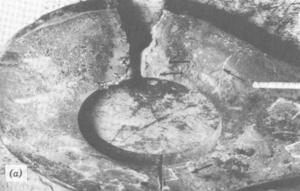
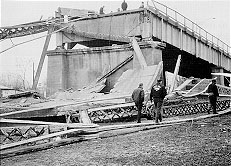 small defect 0.1 inches deep. The analysis showed that the bridge was carrying much heavier loads than it was designed for. Cars were heavier too and there were more of them, putting more strain on the small defect in the eyebar. In addition, the bridge had been poorly maintained, further weakening the structure. These days, bridges can still fail, but they maybe don’t quite as often, and most last longer than 40 years.
small defect 0.1 inches deep. The analysis showed that the bridge was carrying much heavier loads than it was designed for. Cars were heavier too and there were more of them, putting more strain on the small defect in the eyebar. In addition, the bridge had been poorly maintained, further weakening the structure. These days, bridges can still fail, but they maybe don’t quite as often, and most last longer than 40 years.

 I find it so hard to believe that my great grandniece, Reece Balcerzak is four years old. Her life started out pretty scary, but she is a strong girl, and she pulled through, quickly proving that a premature birth and a long hospital stay was not going to stop this “little firecracker.” She is full of life and energy. She is her mommy, Katie Balcerzak’s mini-me, and her daddy, Keifer Balcerzak’s pride and joy. This precious little girl definitely keeps her parents on their toes.
I find it so hard to believe that my great grandniece, Reece Balcerzak is four years old. Her life started out pretty scary, but she is a strong girl, and she pulled through, quickly proving that a premature birth and a long hospital stay was not going to stop this “little firecracker.” She is full of life and energy. She is her mommy, Katie Balcerzak’s mini-me, and her daddy, Keifer Balcerzak’s pride and joy. This precious little girl definitely keeps her parents on their toes.
These days, Reece has a new title. She is big sister to her brother Aysa Balcerzak, who arrived on November 8, 2021. I really think Reece feels like this is her most important title. Having a baby brother means that she has lots of new jobs. She can go get things for her parents, entertain her brother, and generally love on her brother…which she does very well. Reece and her parents might not have known how much they “needed” Aysa, but I think they do now. For Reece, having a sibling is very cool…for now. We all know how 
 siblings can get, but they always love each other…always. Aysa is going to be very blessed to have such a sweet big sister as Reece, and she will be very blessed by him.
siblings can get, but they always love each other…always. Aysa is going to be very blessed to have such a sweet big sister as Reece, and she will be very blessed by him.
Reece is spreading her wings these days to find out what kinds of things she likes to do. She tried t-ball and had a good time. I’m not sure how she felt about the game itself, but she has plenty of time to explore athletic ideas. One thing that Reece has already perfected is her great…and I really mean great smile. That little girl is always happy, and her face is always lit up. Not everyone has such a gift. Reece is a joyous little girl, and a great blessing to her parents, grandparents, and everyone who knows her. Today is Reece’s 4th birthday. Happy birthday Reece!! Have a great day!! We love you!!
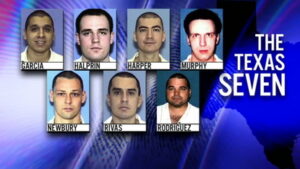 Maybe they were just wanting to be home for Christmas, and not knowing exactly how long it would take…while hiding out from the law, that is…the Texas Seven decided to get a jump start on the journey. No, probably not. It wasn’t Christmas with loved ones that was on their minds…it was freedom. On December 13, 2000, seven prisoners dubbed the “Texas Seven” by the media, broke out of maximum-security prison in South Texas, setting off a massive six-week manhunt. The prisoners were Joseph Christopher Garcia, Randy Ethan Halprin, Larry James Harper, Patrick Henry Murphy Jr, Donald Keith Newbury, George Angel Rivas Jr, and Michael Anthony Rodriguez. The escapees overpowered civilian employees and prison guards in the maintenance shop where they worked and stole clothing, guns, and a vehicle. The men left a note saying: “You haven’t heard the last of us yet,” and they were right. These men were convicted of crimes like murder, rape, and robbery. They were set to be executed soon, so they had nothing to lose.
Maybe they were just wanting to be home for Christmas, and not knowing exactly how long it would take…while hiding out from the law, that is…the Texas Seven decided to get a jump start on the journey. No, probably not. It wasn’t Christmas with loved ones that was on their minds…it was freedom. On December 13, 2000, seven prisoners dubbed the “Texas Seven” by the media, broke out of maximum-security prison in South Texas, setting off a massive six-week manhunt. The prisoners were Joseph Christopher Garcia, Randy Ethan Halprin, Larry James Harper, Patrick Henry Murphy Jr, Donald Keith Newbury, George Angel Rivas Jr, and Michael Anthony Rodriguez. The escapees overpowered civilian employees and prison guards in the maintenance shop where they worked and stole clothing, guns, and a vehicle. The men left a note saying: “You haven’t heard the last of us yet,” and they were right. These men were convicted of crimes like murder, rape, and robbery. They were set to be executed soon, so they had nothing to lose.
These were not the kind of people that anyone wanted to have running around the state…or anywhere outside of prison walls. Soon after escaping from the Connally Unit lockup in Kenedy, Texas, the fugitives picked up another getaway vehicle. This one provided by the father of one of the men. They robbed a Radio Shack store in Pearland, Texas, coming out with cash and police scanners. On Christmas Eve, the escapees struck a sporting-goods store in Irving, Texas, where they stole a large amount of cash and weapons. In the process, the men killed police officer Aubrey Hawkins, shooting him multiple times with multiple weapons and running him over. Now they really had nothing to lose. Now, they were cop killers on top of everything else. It looked like it was time to get out of Dodge…or in this case, Texas.
The Texas Seven headed to Colorado, where they purchased a motor home and told people they were Christian missionaries. They rented a spot at a trailer park near Woodland Park, Colorado. They were there about a month before things started to fall apart. On January 22, 2001, after seeing the “Texas Seven” profiled on the TV program America’s Most Wanted, someone tipped off the police to the group of seven “missionaries” near Woodland Park. During the raid, ringleader George Rivas was captured along with three of the other men. Larry James Harper decided that he was not going back to prison, so he committed suicide after being surrounded by  police. Two days later, law enforcement officials closed in on the two remaining escapees at a hotel in Colorado Springs. A standoff ensued, during which the fugitives conducted phone interviews with a TV news station and claimed their escape was a protest against Texas’ criminal justice system. Someone always has to add a bit of drama to justify their new crimes. There was no evidence indicating their claim was justified. The men then surrendered to authorities. Their crime spree was over. Of the six remaining, four have since been executed. Randy Ethan Halprin and Patrick Henry Murphy Jr are currently back at Polunsky Unit in Livingston, Texas on Death Row awaiting execution.
police. Two days later, law enforcement officials closed in on the two remaining escapees at a hotel in Colorado Springs. A standoff ensued, during which the fugitives conducted phone interviews with a TV news station and claimed their escape was a protest against Texas’ criminal justice system. Someone always has to add a bit of drama to justify their new crimes. There was no evidence indicating their claim was justified. The men then surrendered to authorities. Their crime spree was over. Of the six remaining, four have since been executed. Randy Ethan Halprin and Patrick Henry Murphy Jr are currently back at Polunsky Unit in Livingston, Texas on Death Row awaiting execution.

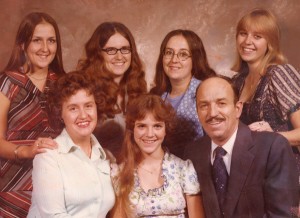 December 12, 2007…a day that rocked my world. It was a day I never expected to see…the day my dad, Allen Spencer went home to be with the Lord. I don’t know why it never occurred to me that someday my parents would be in Heaven, but it didn’t. Nevertheless, these days, all we have are the memories, as we wait for the day when we will all be together again in Heaven.
December 12, 2007…a day that rocked my world. It was a day I never expected to see…the day my dad, Allen Spencer went home to be with the Lord. I don’t know why it never occurred to me that someday my parents would be in Heaven, but it didn’t. Nevertheless, these days, all we have are the memories, as we wait for the day when we will all be together again in Heaven.
My dad was a great guy. He was a girl dad, and he wore it well. I don’t know how he managed to survive having five daughters and a wife, all vying for one bathroom, but he did. Ours was probably what the song writer meant, when he wrote “Love Grows Best In Little Houses.” It never felt crowded. It always felt just right. I wonder if my parents knew, when I was just 3 years old that the house they bought then, would be their forever home. At that time my older sister, Cheryl Masterson and I believe my younger sister, Caryl Reed were there, as well as I was. Two more daughters would join the family in that little house, now forever home. There were a few changes, like converting the garage to a bedroom and a utility room, that gave a little more space. Then, in my parents’ later years, an enclosed porch was added. The house just always felt like home…to all of us. Of course, it was our parents that really made the house a home. Their love filled the house, and we were always blessed by them and their love. Any house can hold a family, but love is what makes a house a home.
The first time the house ever felt empty, and maybe a little wrong, was after my dad went home to Heaven. Mom’s lifelong companion was gone now, as was our dad, who had always made us feel like princesses. We could see him in every room, but these were just memory visions. His love still lingered in each and every room. We knew that he still loves us, of course, but everything suddenly felt wrong…like the world kept going, but he had stopped. That is what happened, of course, but it felt to us like life had stepped out or its proper order. We would notice the same thing a few years later, when our mom, Collene Spencer went home to join Dad in Heaven. The house was still filled with the memory visions of them and their love, but it was kind of empty and lonely somehow.
Each year as we remember their homegoings, we are reminded of just how precious they were to us, and how we want to make them proud of how we have lived our lives. They raised us well, and taught us to love God and country, and to always try to do the right things. Now, we look forward to the day we will join them in Heaven, because that is where they are waiting in our future in Heaven, and what a joyous day it will be when we join them there. We love and miss you both on this, the 14th anniversary of your homegoing, Dad, and we can’t wait to see you again.

 My nephew, Barry Schulenberg is a very driven man. He is always busy doing something. If he’s not working at his job as a mechanic for the State of Wyoming, he is taking care of his property east of Casper; helping his Uncle Ron Schulenberg with things like cutting wood for his wood stove; or hiking with his wife, Kelli and their dog Scout. Barry is pretty much always busy.
My nephew, Barry Schulenberg is a very driven man. He is always busy doing something. If he’s not working at his job as a mechanic for the State of Wyoming, he is taking care of his property east of Casper; helping his Uncle Ron Schulenberg with things like cutting wood for his wood stove; or hiking with his wife, Kelli and their dog Scout. Barry is pretty much always busy.
Barry is the field mechanic for the State of Wyoming in Casper. Being a field mechanic is far more interesting than just your average everyday shop mechanic, because…well, you aren’t stuck in the shop. Barry travels to several towns and sites around the Natrona County area to service the equipment used in these areas. It really isn’t feasible for these areas to bring their equipment all the way to Casper for servicing, so, the mechanic goes to the equipment. Also, whenever a truck or other piece of equipment breaks down, Barry goes out to where it is to fix it. This can mean some overtime, and some long drives, but for the most part it really is an enjoyable job for Barry. The state depends on his expertise and his loyalty to keep all the equipment up and running, and Barry likes to be out on the road sometimes too.
Barry and Kelli love to be in the mountains. They love to go camping, skiing, hiking, and snowshoeing. Their dog, Scout is their best companion, although if you ask Kelli, Scout is convinced that he is the boss of the family, and since he’s a dog, it’s hard to argue that point. Really, I think that most pets consider their humans to be their pets. They feel about their humans the way the humans feel about them. Barry and Kelli got scout after their first dog, Dakota passed away, and while they are two very different kinds of dogs, both in breed and personality, Scout has been a good fit, and I’m sure that Dakota is happy that his parents are happy. Scout 
 loves to be beside Barry in whatever he is doing, and then keeps watch over the place while Barry and Kelli are working.
loves to be beside Barry in whatever he is doing, and then keeps watch over the place while Barry and Kelli are working.
Like most of us, Barry and Kelli work to live, not live to work. They have many things they would much rather be doing that working. They really love going to concerts, and often travel to see their favorite singers. Of course, it’s not all about the singer, but also about seeing the country around them. That’s what makes the journey fun. Today is Barry’s birthday. Happy birthday Barry!! Have a great day!! We love you!!

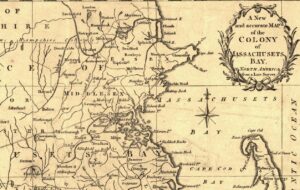 In the late 1600s, Britain and France both owned property in North America, and they were prone to periodic attacks on the colonies belonging to the other. On December 10, 1690, when the Massachusetts Bay Colony launched an ill-fated attack on Quebec, the result was a near-mutiny that forced the Massachusetts Bay Colony to issue the first paper currency in the history of the Western Hemisphere.
In the late 1600s, Britain and France both owned property in North America, and they were prone to periodic attacks on the colonies belonging to the other. On December 10, 1690, when the Massachusetts Bay Colony launched an ill-fated attack on Quebec, the result was a near-mutiny that forced the Massachusetts Bay Colony to issue the first paper currency in the history of the Western Hemisphere.
Sometimes, these “little skirmishes” put the governments in a position of a cash flow problem. They sometimes had to resort to IOUs to pay the men. In 1690, during one such war, Governor William Phips of Britain’s Massachusetts Bay Colony made a promise to his men that he could not keep. Phips was just back from a successful invasion of the French colony of Acadia. When it went so well, he decided to raid Quebec City. For their participation, Phips promised his volunteer troops half the loot. This loot was to be in addition to their usual pay. In those days, the soldiers were usually paid in coins, but sometimes shortages of official currency in the colonies forced armies to temporarily issue IOUs. Sometimes, even that was difficult, for lack of paper, so in one case, the men were actually paid with cut-up playing cards. The troops were then allowed to exchange the playing cards for goods and services until they received their actual pay.
As to Phips…he found himself with a rather large dilemma, because while he made a grand promise, the raid was a failure, when he didn’t manage to take the city. He was forced to return to Massachusetts with a damaged fleet and no treasure. With a shortage of coins and nothing else to pay the troops with, Phips faced a potential mutiny. So…out of options, on December 10th, 1690, the General Court of Massachusetts ordered the printing of a limited amount of government-backed, paper currency to pay the soldiers. It was the first such printing of paper money in North America. A few months later, with tax season approaching, a law was passed removing the limit on how much currency could be printed, calling for the immediate printing of more, and permitting the use of paper currency for the payment of taxes, which seems odd considering it had no value.
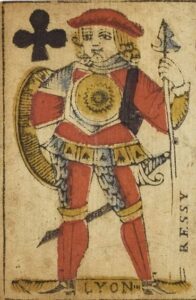
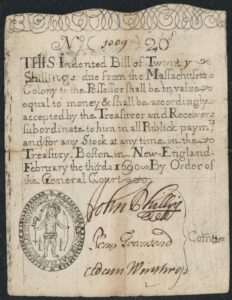 People didn’t trust the paper currency, making it unpopular for anything except paying taxes and before long, it was phased out. Nevertheless, within a few years, paper currency returned to Massachusetts. The Bank of England began issuing banknotes in 1695, also to pay for war against the French, and they became increasingly common throughout the 18th Century. Paper money has continued to cause controversy throughout the early history of the United States, and in many cases, remains so to this day. It was tied to the value of gold for a surprisingly long time, but in 1973 President Richard Nixon officially ended the international convertibility of the US dollar into gold. The printing of paper currency has always been a bit of a shady venture, because it is almost always done without the backing of gold. Without gold to back up the value of the paper currency, the economy is in danger.
People didn’t trust the paper currency, making it unpopular for anything except paying taxes and before long, it was phased out. Nevertheless, within a few years, paper currency returned to Massachusetts. The Bank of England began issuing banknotes in 1695, also to pay for war against the French, and they became increasingly common throughout the 18th Century. Paper money has continued to cause controversy throughout the early history of the United States, and in many cases, remains so to this day. It was tied to the value of gold for a surprisingly long time, but in 1973 President Richard Nixon officially ended the international convertibility of the US dollar into gold. The printing of paper currency has always been a bit of a shady venture, because it is almost always done without the backing of gold. Without gold to back up the value of the paper currency, the economy is in danger.
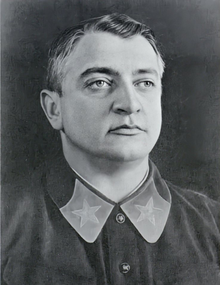
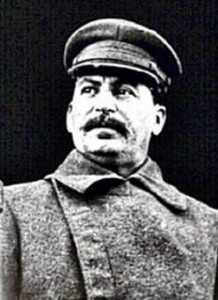 Mikhail Tukhachevsky saw it coming, really. Sometimes it’s rather sad to be right about certain things. Tukhachevsky had been nicknamed the “Red Napoleon,” meaning that he was a popular Soviet military leader in Stalin’s Red Army. Tukhachevsky had no idea just how much more important the ideology would be to Stalin, than loyalty, ability, or anything else.
Mikhail Tukhachevsky saw it coming, really. Sometimes it’s rather sad to be right about certain things. Tukhachevsky had been nicknamed the “Red Napoleon,” meaning that he was a popular Soviet military leader in Stalin’s Red Army. Tukhachevsky had no idea just how much more important the ideology would be to Stalin, than loyalty, ability, or anything else.
After his service in World War I of 1914-1917 and in the Russian Civil War of 1917-1923, from 1920 to 1921 Tukhachevsky commanded the Soviet Western Front in the Polish–Soviet War. He was moving up the ranks, and with the Soviet forces under his command, he successfully repelled the Polish forces from Western Ukraine, driving them back into Poland. Nevertheless, the Red Army suffered defeat outside of Warsaw, and the war ended in a Soviet defeat.
Tukhachevsky went on to serve as chief of staff of the Red Army from 1925 through 1928, as assistant in the People’s Commissariat of Defense after 1934, and as commander of the Volga Military District in 1937. He achieved the rank of Marshal of the Soviet Union in 1935. Still, all of that did not protect him, in fact it put him in more danger, because he was just a little way under Stalin, and that was not going to bode well for him.
Tukhachevsky was arrested in 1936, suspected of being a German spy. The charges included Tukhachevsky’s supposed plot to overthrow Stalin. After he was arrested, the guards coerced a confession out of him. This was at the very beginning of The Great Terror, a term which historians have borrowed from the French Revolution. It refers to the paroxysm of state-organized bloodshed that overwhelmed the Communist Party and Soviet society during the years 1936-1938. It was also known as the Great Purges.
During this time, Stalin actually had over a million of his own soldiers killed for imagined wrongs. Stalin was, in 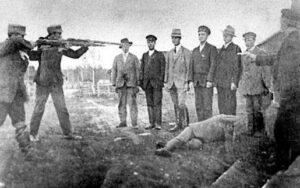 reality, half crazy. He was known to pluck a live chicken, just to see the reaction from his men. It wasn’t a really big stretch to move to killing soldiers or civilians, so the Great Terror wasn’t too far out there for him. As for Tukhachevsky, Stalin sentenced him to death in March 1938. He was executed on June 12, 1937. Even the men who had to judge the soldiers in those “sham” trials, were not free from danger. One of them, Ivan Belov said, “Tomorrow, I shall be put in the same place.” Belov was right. He was arrested on January 7, 1938. He was later executed as well. I can’t imagine how insane Stalin must have been. When you think about it, most of the men and women who were under Stalin’s rule, were too terrified to be disloyal.
reality, half crazy. He was known to pluck a live chicken, just to see the reaction from his men. It wasn’t a really big stretch to move to killing soldiers or civilians, so the Great Terror wasn’t too far out there for him. As for Tukhachevsky, Stalin sentenced him to death in March 1938. He was executed on June 12, 1937. Even the men who had to judge the soldiers in those “sham” trials, were not free from danger. One of them, Ivan Belov said, “Tomorrow, I shall be put in the same place.” Belov was right. He was arrested on January 7, 1938. He was later executed as well. I can’t imagine how insane Stalin must have been. When you think about it, most of the men and women who were under Stalin’s rule, were too terrified to be disloyal.

 So much has changed for my niece, Jessi Sawdon, this year. When her husband, Jason received a promotion, it also took their family from Casper, Wyoming to Cheyenne, Wyoming. The move has been a new adventure for the whole family. They have spent their time getting to know their new city and all the great things it has to offer. Jessi’s parents are thankful that the move wasn’t further. The move also put them a little closer to Jessi’s sister, Lindsay Moore and her family in Laramie, Wyoming. They have been able to get together more, so their daughters, cousins, Adelaide Sawdon and Mackenzie Moore, get to spend a little more time on play dates. In that way, the move has been a gift for their family, and that has been good for their daughters.
So much has changed for my niece, Jessi Sawdon, this year. When her husband, Jason received a promotion, it also took their family from Casper, Wyoming to Cheyenne, Wyoming. The move has been a new adventure for the whole family. They have spent their time getting to know their new city and all the great things it has to offer. Jessi’s parents are thankful that the move wasn’t further. The move also put them a little closer to Jessi’s sister, Lindsay Moore and her family in Laramie, Wyoming. They have been able to get together more, so their daughters, cousins, Adelaide Sawdon and Mackenzie Moore, get to spend a little more time on play dates. In that way, the move has been a gift for their family, and that has been good for their daughters.
Jessi was also able to continue working for the same company she was before…L?M Studio, since she has the option to work from home, both before and after the move. Being able to work from home has been such a blessing, because family is very important to Jessi and Jason, and as we all know, kids grow up so fast. Being able to be a stay-at-home, and yet working mom has given Jessi the ability to spend quality time with her daughter. Jessi is a great mom, and she has a wonderful relationship with Adelaide. They are both bubbly and rally funny people, and they, along with Jason, keep the family home filled with laughter.
Jessi is a community minded person, often helped with projects like David Street Station and Natrona County Public Library, both in Casper. I don’t think she was paid for her help, even though her job is in advertisement and communication, but Jessi probably would have helped promote the projects anyway, because she is so community minded. I will be interested to see what her presence in Cheyenne will bring for the community. It is in her nature to make the community around her better, and to bring people together. She is very good at 
 her job, both professionally and in her personal volunteer work. Her energy and love of people makes Jessi a perfect person to do the work she does, and she make all of us in her family very proud of her.
her job, both professionally and in her personal volunteer work. Her energy and love of people makes Jessi a perfect person to do the work she does, and she make all of us in her family very proud of her.
Jessi and Jason are so perfect together, and their great sense of humor tends to play off of each other, almost like it was planned, or that they are so in tune with each other that they think alike on just about everything. In fact, they are so perfect for each other, that I can’t imagine them any other way. It really seems like they have been together far longer that the 12 years they have been together. Today is Jessi’s birthday. Happy birthday Jessi!! Have a great day!! We love you!!
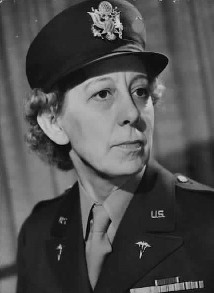 The attack on Pearl Harbor, on December 7, 1941, rocked the United States. It was so unexpected, but while it brought so much destruction, it also brought out so many heroes too. Orders did not need to be given, everyone simply jumped into action, without being told. Still, the destruction was so overwhelming, and the attack just kept coming. People were dodging bullets and bombs, as well as flying debris and suicide bombers. A heavy, choking, acrid smoke filled the air, making it very hard to breathe. There would be making deaths that day, but there would also be heroes.
The attack on Pearl Harbor, on December 7, 1941, rocked the United States. It was so unexpected, but while it brought so much destruction, it also brought out so many heroes too. Orders did not need to be given, everyone simply jumped into action, without being told. Still, the destruction was so overwhelming, and the attack just kept coming. People were dodging bullets and bombs, as well as flying debris and suicide bombers. A heavy, choking, acrid smoke filled the air, making it very hard to breathe. There would be making deaths that day, but there would also be heroes.
Lieutenant Annie G Fox was stationed at Hickam Airfield in Hawaii on December 7, 1941, and she was the chief nurse on duty that morning. When the attack began, she sprang into action to tend to the injured and dying service personnel on the base. For her outstanding performance, Fox was recommended for and awarded the Purple Heart, but she was not injured during the attack. Fox was presented the Purple Heart on October 26, 1942, at Hickam Field. Colonel William Boyd, Post Commander read the  citation which was commanded by Brigadier General W E Farthing and signed by Colonel L P Turner, Air Corps Executive Officer.
citation which was commanded by Brigadier General W E Farthing and signed by Colonel L P Turner, Air Corps Executive Officer.
Then, in 1944 in a horrible twist of fate, the rules for receiving the Purple Heart changed, and Fox no longer qualified. The recipient needed to have sustained battle wounds. Fox’s medal was rescinded. She received the Bronze Star instead. I can understand the reasons behind the change, but it seems wrong that her medal that was legitimately earned in 1941, could be taken back in 1944. It should have been grandfathered or something. Nevertheless, the Purple Heart was not returned.
Purple Heart or Bronze Star aside, Lieutenant Annie Fox showed great spirit that day. In the face of great  personal danger, she dodged the hail of bullets to reach many wounded people and she saved many lives. She could have been shot, bombed, breathed in poisonous gasses, or been hit by debris. It didn’t stop her. She saw the wounded, and she ran headlong into the danger, thereby saving her fellow man. Whether she was properly awarded the Purple Heart or not, she was definitely a hero.
personal danger, she dodged the hail of bullets to reach many wounded people and she saved many lives. She could have been shot, bombed, breathed in poisonous gasses, or been hit by debris. It didn’t stop her. She saw the wounded, and she ran headlong into the danger, thereby saving her fellow man. Whether she was properly awarded the Purple Heart or not, she was definitely a hero.
Annie Gayton Fox was born to Charles Fox and Deidamia (Gayton) Fox in East Pubnico, Nova Scotia, Canada, on August 4, 1893. She died at age 93 on January 20, 1987, in San Mateo County, California. Her years of service ran from July 3, 1918 through December 31, 1945. She retired as a Major in the US Army.
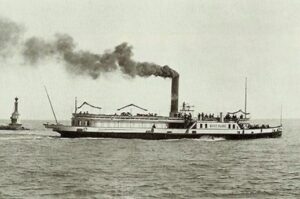 Disaster was eminent that December 6, 1917, and indeed, the disaster had already begun, but it was very likely to get far worse. Vincent Coleman and his co-worker, Chief Clerk William Lovett were working at the Richmond station where they received word that there was a crash between the French munitions ship, SS Mont-Blanc, and a Norwegian ship, SS Imo. A collision, in and of itself, would not have been any more serious than any other collision, except that the French munitions ship, was carrying a deadly cargo of high explosives. The likelihood of an explosion was the eminent disaster that was waiting to happen.
Disaster was eminent that December 6, 1917, and indeed, the disaster had already begun, but it was very likely to get far worse. Vincent Coleman and his co-worker, Chief Clerk William Lovett were working at the Richmond station where they received word that there was a crash between the French munitions ship, SS Mont-Blanc, and a Norwegian ship, SS Imo. A collision, in and of itself, would not have been any more serious than any other collision, except that the French munitions ship, was carrying a deadly cargo of high explosives. The likelihood of an explosion was the eminent disaster that was waiting to happen.
That day, in what was called the Halifax Explosion, Coleman is remembered as one of the heroic figures, because of his quick-thinking message to an oncoming train to stop and remain out of range before the explosion. Coleman knew what was coming, and he saved many lives as a result of holding back that train. born on March 13th, 1872, was a train dispatcher for the Canadian Government  Railways. Moments after the collision, the SS Mont-Blanc caught fire and the crew abandoned the ship. Now it was up to Vincent, trying to hold back a sense of panic, to figure out what trains were going to be coming into Halifax. He knew they had to be warned.
Railways. Moments after the collision, the SS Mont-Blanc caught fire and the crew abandoned the ship. Now it was up to Vincent, trying to hold back a sense of panic, to figure out what trains were going to be coming into Halifax. He knew they had to be warned.
Part of the reason for such a panicked state was that the French ship had drifted from the middle of the channel to the pier. While still burning, she beached herself on the shore in a matter of minutes. The captain warned Coleman of the deadly cargo on the ship, and Coleman flew into action. He immediately sent a telegraph to the Number 10 overnight express train that was coming in from Saint John, New Brunswick, carrying over 300 passengers, telling them to stop where they were and remain there until further notice, thereby saving the lives of passengers and crew. Then, Lovett and Coleman quickly evacuated their station, but Coleman couldn’t stay 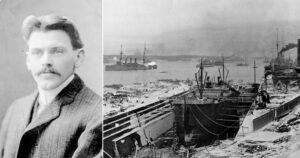 away. There was too much danger. Coleman returned to the station and continued to warn trains all the way to Truro in order to stop them from any closer to the scene. Coleman’s morse was code message was this: “Hold up the train. Ammunition ship afire in harbor making for Pier 6 and will explode. Guess this will be my last message. Good-bye boys.” While Coleman’s message stopped the Number 10 train, saving the lives of 300 people, and also likely saved other lives with his warnings to stay back, he lost his own life in the endeavor when the ship exploded. Staying at the station was a courageous act that cost Coleman his life.
away. There was too much danger. Coleman returned to the station and continued to warn trains all the way to Truro in order to stop them from any closer to the scene. Coleman’s morse was code message was this: “Hold up the train. Ammunition ship afire in harbor making for Pier 6 and will explode. Guess this will be my last message. Good-bye boys.” While Coleman’s message stopped the Number 10 train, saving the lives of 300 people, and also likely saved other lives with his warnings to stay back, he lost his own life in the endeavor when the ship exploded. Staying at the station was a courageous act that cost Coleman his life.

